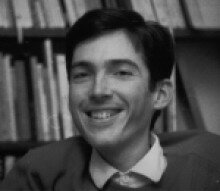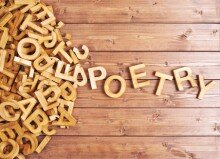
Hrvoje Pejakovic, the poet and literary critic, was born in 1960 in Zagreb. He attended elementary and high school in Dubrovnik and studied Comparative Literature and Philosophy at the Arts Faculty in Zagreb. He published poetry, critical works and essays in many magazines and newspapers, and could be heard on Croatian television and radio.
Pejakovic edited the literary magazines Pitanja (Questions) and Europski glasnik (European Messenger). Apart from four collections of poetry, his bibliography includes two very valuable and influential books of essays on Croatian contemporary literature entitled Prostor pisanja (The Space of Writing) and Prostor citanja (The Space of Reading). He compiled an anthology of Croatian poetry and prose with Zvonimir Mrkonjic and Andriana Skunca entitled Nasa ljubavnica tlapnja (Our Lover, Illusion). Pejakovic died in Zagreb in 1996. His Anthology of Contemporary Croatian Poetry was published posthumously in 1997. Some of his poetry appears in French and Italian translations.
When Pejakovic, one of the most influential literary critics and one of the finest young poetic voices of the eighties and the nineties, died from pneumonia complications in a Zagreb hospital, quite unexpectedly and quite 'foolishly', after long years of struggle with an incurable and progressive illness that had bound him to a wheelchair, many of his colleagues from the generation of authors who entered literary life in connection with Quorum Literary Magazine, wept earnestly. They knew that his death would have serious implications for the Croatian literary scene. They could not have been more right in their pessimism: with the death of Hrvoje Pejakovic, the analytical approach to poetry practically disappeared from the literary supplements of daily newspapers, giving more ground to political sensationalism in literary criticism. Pejakovic was a man of letters who possessed – apart from his talent and sensibility – a rare combination of great literary taste and an unfaltering ethical instinct for defending intellectual positions in a world of endangered values. Pejakovic offered a highly literate response in his poetry to the fears of the modern age. Existential questions about the meaning of human suffering blend with scenes from the poet’s daily life. The fragmentation of drab reality – the principal poetic procedure of Hrvoje Pejakovic – leads to occasional moments of bliss, to sudden spiritual manifestations that immediately bring to mind Joyce’s concept of epiphany defined as “the revelation of the whatness of a thing”.
Pejakovic based his poetic universe, metaphorically depicted as a “question-house with broken windows”, on a phenomenological type of reasoning. In a grim world, in which silence prevails over any existing and imaginable form of language, the poet is defined as “the one who is not a magician” and who – as such – plays a part in the process of dismemberment of the primeval Word. The famous lyre without strings that modernists inherited from the times of antiquity is now being approached from a new angle. The voice that speaks in the poems of Hrvoje Pejakovic is a highly skeptical post-modern voice that, in spite of all, still cares about the destiny of the Word. The poet joins in the decomposition of what Rilke once defined as “that which thinks of us”. What used to be sacred is now being dragged through the mud. Speaking about a 'muddy' deity, Pejakovic brings new light to well-known modernistic themes. Smart and abrasive, unconstrained by conventions of form, in spite of his radical skepticism, Pejakovic was constantly in pursuit of “the literature that is no longer possible”.
Publications:
Drugacije, jednostavno | Different, As Simple as That (Zagreb, 1984)
Zabranjeni grad | The Forbidden City (Zagreb, 1988)
Nevjerica, nesanica | Disbelief, sleeplessness (Zagreb, 1991)
Sjeverni ugao | Northern corner (Zagreb 1992)
Anthologies:
Nasa ljubavnica tlapnja | Our Lover, Illusion (Zagreb 1992)
Antologija suvremene hrvatske poeziije | The Anthology of Contemporary Croatian Poetry (Zagreb 1997)
Books in Translation:
Ville interdite, traduit du Croat par Vanda Miksic et Brankica Radic, Est-Ouest (Paris, 2001)
Translations of Poetry published in Literary Magazines:
Il mondo di carta di Hrvoje Pejakovic da cura di Mladen Machiedo, Poesia n°101, Crocetti Editore, Milano, Decembre 1996
Language: Croatian
Links:
Information from the Croatian Embassy about Pejakovic
Language: French
Books from Pejakovic
Language: French






